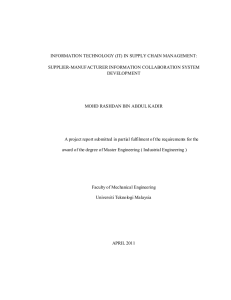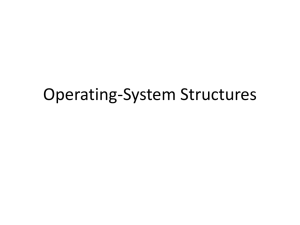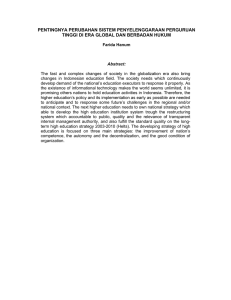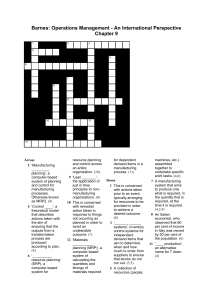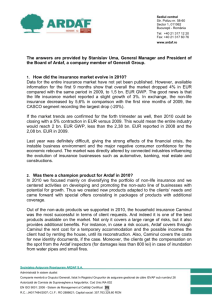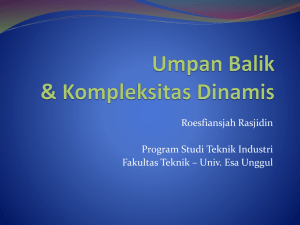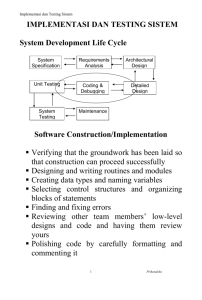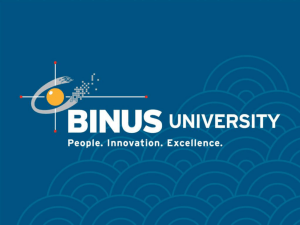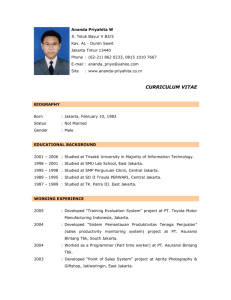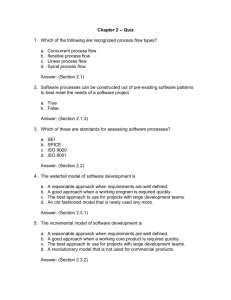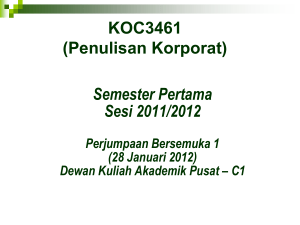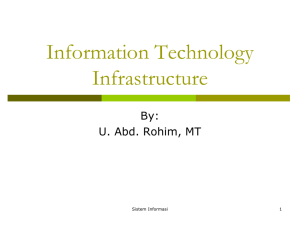Information Systems Planning
advertisement
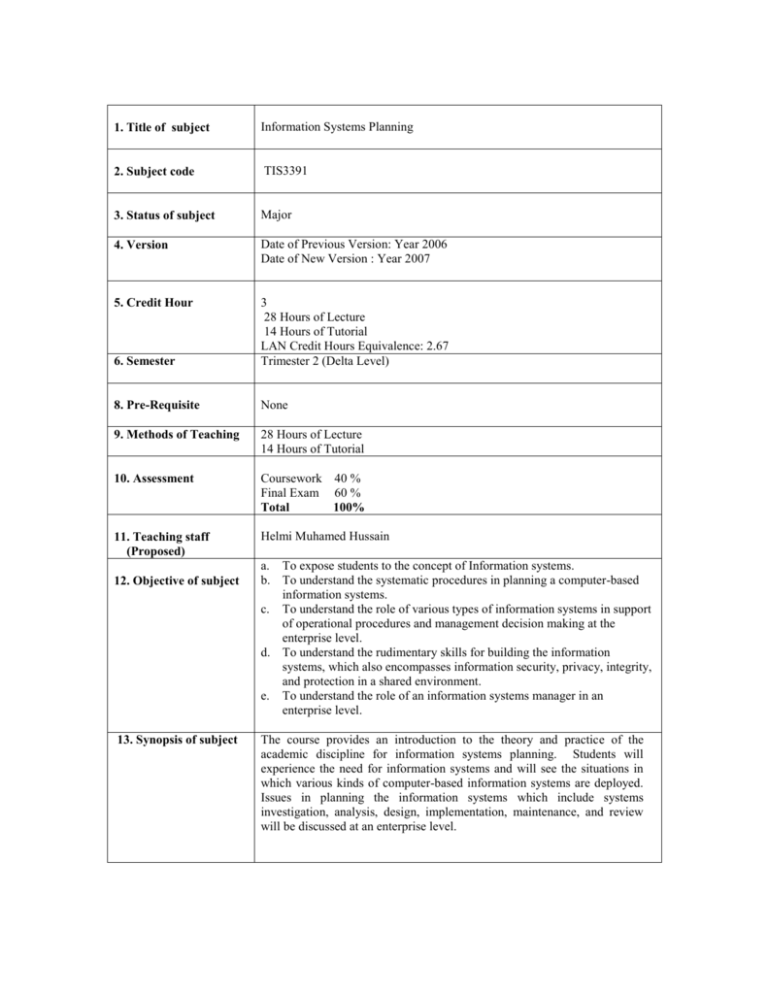
1. Title of subject Information Systems Planning 2. Subject code TIS3391 3. Status of subject Major 4. Version Date of Previous Version: Year 2006 Date of New Version : Year 2007 5. Credit Hour 6. Semester 3 28 Hours of Lecture 14 Hours of Tutorial LAN Credit Hours Equivalence: 2.67 Trimester 2 (Delta Level) 8. Pre-Requisite None 9. Methods of Teaching 28 Hours of Lecture 14 Hours of Tutorial 10. Assessment Coursework 40 % Final Exam 60 % Total 100% 11. Teaching staff (Proposed) Helmi Muhamed Hussain 12. Objective of subject 13. Synopsis of subject a. To expose students to the concept of Information systems. b. To understand the systematic procedures in planning a computer-based information systems. c. To understand the role of various types of information systems in support of operational procedures and management decision making at the enterprise level. d. To understand the rudimentary skills for building the information systems, which also encompasses information security, privacy, integrity, and protection in a shared environment. e. To understand the role of an information systems manager in an enterprise level. The course provides an introduction to the theory and practice of the academic discipline for information systems planning. Students will experience the need for information systems and will see the situations in which various kinds of computer-based information systems are deployed. Issues in planning the information systems which include systems investigation, analysis, design, implementation, maintenance, and review will be discussed at an enterprise level. Kursus ini memperkenalkan pelajar kepada perancangan sistem maklumat. Pelajar-pelajar akan didedahkan kepada penggunaan sistem maklumat dan bagaimana pelbagai jenis sistem maklumat berasaskan komputer diimplementasikan. Isu-isu perancangan sistem maklumat yang membabitkan penyelidikan, analisis, rekabentuk, implementasi, penyelenggaraan, dan penyemakan sistem akan turut dibincangkan pada tahap “enterprise”. 13. Learning Outcomes By the end of the subject, students should be able to: analyse information systems in a variety of contexts (social, organisational) using a range of appropriate approaches and methodologies. recognise and apply methods appropriate to IS in the context of a research project. understand and integrate concepts from a range of academic disciplines contributing to IS (including, but not limited to, IS strategy, organisation behaviour and systems thinking) and context domains. critically evaluate the strengths and weaknesses of Information Systems methodologies and predict aspects that are likely to lead to failure. formulate and test arguments, identify weaknesses and counter arguments. Programme Outcomes % of contribution 5 Ability to apply soft skills in work and career related activities 14. Details of subject Good understanding of fundamental concepts 25 Acquisition and mastery of knowledge in specialized area 30 Acquisition of analytical capabilities and problem solving skills 15 Adaptability and passion for learning 5 Cultivation of innovative mind and development of entrepreneurial skills 15 Understanding of the responsibility with moral and professional ethics 5 Course Contents 1. Current Issues and Future Trends in Information Systems (IS) Hour 3 - Information concepts History and motivation for IS The IS environment The IS challenges Reasons for studying IS Planning Computer-Based Information Systems - Concepts of E-Commerce - Transaction Processing System - Management Information System (MIS) - Decision Support System (DSS) - Workflow Systems and Enterprise Resource Planning (ERP) - Supply Chain Management (SCM) - Customer Relationship Management (CRM) - Information System in Logistics and Transportation 2. Organizations and Information Systems Organizational structure and IS Organizational culture and change - Change Model Control in Systems - Systems in Management - Multiple uses of Information - Reengineering - Continuous Improvement - Technology Diffusion, Infusion and Acceptance - Outsourcing and Downsizing Total Quality Management (TQM) - - 3. Resource Planning for IS - Human Resource Planning - Enterprise Resource Planning - IS Redesigning Strategies - Business Process with E-business - Business Process with ERP - Resource Planning in Logistics and Transportation System - Planning for Transportation and Information Network Infrastructure - Planning for Tracing and Tracking System 4. Planning to Organize Data and Information - Data gathering and analysis techniques - Planning for data model - Planning to develop e-commerce 3 3 3 model - Planning for DBMS 5. Planning for Software and Hardware - Operating system (OS) selection: desktop OS , workgroup OS, and Enterprise OS - Application software for IS - Hardware selection techniques - Software & hardware upgrade planning Planning for Systems Configuration and Administration - Operation system configuration & administration planning - DBMS administration planning - Network administration planning 3 6. 7. Planning for Real Time Processing - Communication Model - Communication Media - Communication Devices - Carriers and Services - Network design and administration plan - Distributed processing planning 8. Planning to Test New IS - User preparation - IS personnel: hiring and training - Site preparation plan - Installation plan - Types of testing IS - Start-up Approaches - direct/crash/plunge, phase/piecemeal, pilot and parallel conversion approaches - User acceptance 9. - Planning for Security, Privacy and Other Ethical Issues Planning to avoid computer-related waste and mistakes (redundancy) Planning to avoid computer-related crimes Planning for privacy Disaster recovery plans Security planning for mobile commerce Planning for IT control and asset protection 3 3 3 4 Total Contact Hours (Equivalent to lecture hours) 15. Text 28 Text Book 1. Carol V. Brown, Daniel W. DeHayes, Jeffrey A. Hoffer, E. Wainright Martin, and William C. Perkins, Managing Information Technology, Prentice Hall, 6th ed., 2009. Reference Books 1. Anita Cassidy, A Practical Guide to Information Systems Strategic Planning, St. Lucie Press/CRC Press, 1998. 2. Richard L. Van Horn, Albert B. Schwarzkopf, and R. Leon Price, Information Systems Solutions: A Project Approach, McGraw-Hill, 1st ed., 2006. 3. Leonard Jessup, and Joseph Valacich, Information Systems Today: Managing in the Digital World, Prentice Hall, 3rd ed., 2008. 4. Cheryl Dunn, J. Owen Cherrington, Anita Sawyer Hollander, Enterprise Information Systems: A Pattern-Based Approach, McGraw-Hill, 3rd ed., 2005. 5. Ralph M. Stair and George W. Reynolds, Principles of Information System, Thomson, 7th ed., 2007.
